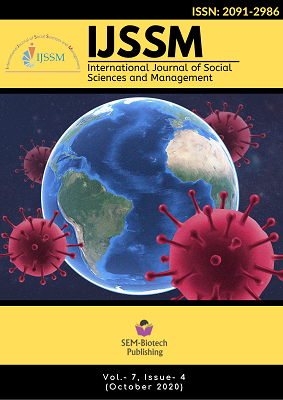Knowledge and Perception on Corona Virus Disease 2019 (COVID-19) Among the General Public in Nepal
DOI:
https://doi.org/10.3126/ijssm.v7i4.32475Keywords:
Knowledge, Perception, COVID-19, general public, NepalAbstract
The global pandemic of COVID-19 has created havoc worldwide with its high transmission rate. The vaccine and drugs are still under trial; thus, the only option is to break the chain of transmission of disease by imparting the knowledge and designing awareness campaigns to educate people about the risks and preventive measures of COVID-19. This study was conducted to explore the knowledge and perception on health behaviors related to prevention along with addressing several myths and practices for COVID-19. An online cross-sectional survey was carried out in the initial days of disease outbreak in Nepal. A structured questionnaire was used for the data collection and recruitment of participants was done using snowball sampling technique. A total of 358 participants from all over the country were recruited for the study. Output measures were portrayed through descriptive statistical analysis with the use of frequencies (n) and percentages (%). Most of the participants (94.1%) knew about the high-risk age group, 38.5% were unaware that SARS-CoV-2 can be transmitted even from objects. Participants had better knowledge on modes of transmission of disease (77.1%) while 49.2% thought that regular surgical mask is highly effective for the preventive measure. Findings of this study suggests that people of Nepal are required to be educated about false beliefs and misconceptions. The findings and concerns raised in the study would be beneficial to design awareness-raising campaigns tailored specifically to the need for and understanding of the Nepalese community.
Int. J. Soc. Sc. Manage. Vol. 7, Issue-4: 183-190
Downloads
Downloads
Published
How to Cite
Issue
Section
License
This license enables reusers to distribute, remix, adapt, and build upon the material in any medium or format for noncommercial purposes only, and only so long as attribution is given to the creator.




